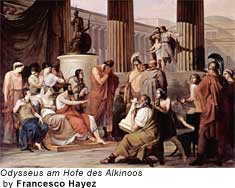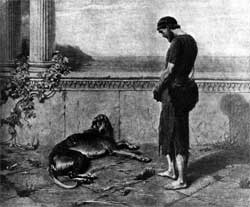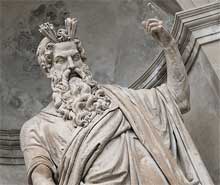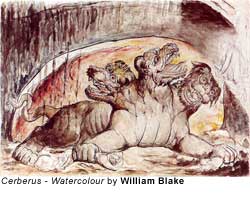They are not only “man’s best friend,” but also favorite pets of the gods. They are not as overpowering as Hercules, but their presence is far more consistent. Dogs find themselves in many of the Greek tales. Here they often serve a similar role as they do in our own society, but their symbolic value increases ten fold. Three, above all else, stand above the rest. And each represents a particular canine virtue we all cherish – loyalty, perseverance, and determination.
 The Faithful Argus : When Odysseus left the fallen Troy for his beloved home of Ithaca, he had no idea what was in store for him. Sirens, drunken Cyclops, and angry gods conspired to keep him and his men from home. Most in Ithaca assumed him dead. His wife, the ever faithful, Penelope; his earnest son Telemachus; and eternally faithful dog Argus, never quite give up hope that Odysseus will return home. For twenty years, Odysseus braved the high seas, and finally his determination was rewarded.
The Faithful Argus : When Odysseus left the fallen Troy for his beloved home of Ithaca, he had no idea what was in store for him. Sirens, drunken Cyclops, and angry gods conspired to keep him and his men from home. Most in Ithaca assumed him dead. His wife, the ever faithful, Penelope; his earnest son Telemachus; and eternally faithful dog Argus, never quite give up hope that Odysseus will return home. For twenty years, Odysseus braved the high seas, and finally his determination was rewarded.
Odysseus, at first, enters the town unnoticed, thanks to a beggar’s disguise - only a few know his real identity. As he approaches his home, the old dog, Argos, bred by Odysseus years ago, takes notice of him. Poor Argus had been exiled from the house and was now living in squalor. On seeing Odysseus, he drops his ears, and wags his tail. Odysseus notices the dog straight away, and is moved to tears by the hound’s faithfulness. Argos, having remained faithful to the end, lets out a cry and dies. Perhaps, Homer’s words are more proper:
 As they were talking, a dog that had been lying asleep raised his head and pricked up his ears. This was Argos, whom Odysseus had bred before setting out for Troy, but he had never had any enjoyment from him. In the old days he used to be taken out by the young men when they went hunting wild goats, or deer, or hares, but now that his master was gone he was lying neglected on the heaps of mule and cow dung that lay in front of the stable doors till the men should come and draw it away to manure the great close; and he was full of fleas. He was in a poor condition after Penelope's suitors had kicked in the ass. As soon as he saw Odysseus standing there, he dropped his ears and wagged his tail, but he could not get close up to his master. When Odysseus saw the dog on the other side of the yard, dashed a tear from his eyes without Eumaeus seeing it, and said:
As they were talking, a dog that had been lying asleep raised his head and pricked up his ears. This was Argos, whom Odysseus had bred before setting out for Troy, but he had never had any enjoyment from him. In the old days he used to be taken out by the young men when they went hunting wild goats, or deer, or hares, but now that his master was gone he was lying neglected on the heaps of mule and cow dung that lay in front of the stable doors till the men should come and draw it away to manure the great close; and he was full of fleas. He was in a poor condition after Penelope's suitors had kicked in the ass. As soon as he saw Odysseus standing there, he dropped his ears and wagged his tail, but he could not get close up to his master. When Odysseus saw the dog on the other side of the yard, dashed a tear from his eyes without Eumaeus seeing it, and said:
"Eumaeus, what a noble hound that is over yonder on the manure heap: his build is splendid; is he as fine a fellow as he looks, or is he only one of those dogs that come begging about a table, and are kept merely for show?"
"This hound," answered Eumaeus, "belonged to him who has died in a far country. If he were what he was when Odysseus left for Troy, he would soon show you what he could do. There was not a wild beast in the forest that could get away from him when he was once on its tracks. But now he has fallen on evil times, for his master is dead and gone, and the women take no care of him. Servants never do their work when their master's hand is no longer over them, for Zeus takes half the goodness out of a man when he makes a slave of him."
So saying he entered the well-built mansion, and made straight for the riotous pretenders in the hall. But Argos passed into the darkness of death, now that he had seen his master once more after twenty years. (Homer, Odyssey, Book 17)
This undying faithfulness and devotion is seen daily by many lucky dog owners. Homer, the great sage, wraps up, in a few lines, the spirit of our dogs. Argus has become the very symbol of faithfulness.
The Dog Who Always Catches Its Prey: : Anyone who knows dogs, know that these animals hardly ever sit and wait patiently. They are doers, and constantly on the go. A particular favorite hobby of theirs is the hunt. On any walk, those holding the leash had better be on guard for a little squirrel or cat. If the dog sees them, the owner had better hold on tight. This characteristic has been noticed for centuries. Dogs are determined. If they set their mind to something there is almost no way to break their will. They’ll decide when, and if, they’re ever going to give up a chase. Some seem willing to run for eternity.
One such dog was Laelaps. Laelaps was a dog in Greek mythology. When Zeus was a baby, a dog, known only as the “golden hound” was charged with protecting the future King of Gods. This may have been the same dog Zeus later gave to Europa. Zeus had fallen deeply in love with the beautiful Europa, and when given the chance stole her away to the island of Crete. There he tried to seduce her by giving her three gifts: Tálos, a giant bronze creature (perhaps more accurately a robot); a javelin that never missed, and Laelaps, a dog that never failed to capture its prey. Europa eventually gave the dog to Minos, King of Crete. After being cured by Procris of a terrible disease, Minos gave her the great dog Laelaps. The dog was soon sent to capture the Teumessian fox, a giant fox that could never be caught. This created a paradox, for the dog always caught its prey, and the fox could not be caught. The chase went on unto Zeus grew weary and confused of the dilemma and simply turned both into stone, frozen forever in the chase.
Zeus had fallen deeply in love with the beautiful Europa, and when given the chance stole her away to the island of Crete. There he tried to seduce her by giving her three gifts: Tálos, a giant bronze creature (perhaps more accurately a robot); a javelin that never missed, and Laelaps, a dog that never failed to capture its prey. Europa eventually gave the dog to Minos, King of Crete. After being cured by Procris of a terrible disease, Minos gave her the great dog Laelaps. The dog was soon sent to capture the Teumessian fox, a giant fox that could never be caught. This created a paradox, for the dog always caught its prey, and the fox could not be caught. The chase went on unto Zeus grew weary and confused of the dilemma and simply turned both into stone, frozen forever in the chase.
 Zeus had fallen deeply in love with the beautiful Europa, and when given the chance stole her away to the island of Crete. There he tried to seduce her by giving her three gifts: Tálos, a giant bronze creature (perhaps more accurately a robot); a javelin that never missed, and Laelaps, a dog that never failed to capture its prey. Europa eventually gave the dog to Minos, King of Crete. After being cured by Procris of a terrible disease, Minos gave her the great dog Laelaps. The dog was soon sent to capture the Teumessian fox, a giant fox that could never be caught. This created a paradox, for the dog always caught its prey, and the fox could not be caught. The chase went on unto Zeus grew weary and confused of the dilemma and simply turned both into stone, frozen forever in the chase.
Zeus had fallen deeply in love with the beautiful Europa, and when given the chance stole her away to the island of Crete. There he tried to seduce her by giving her three gifts: Tálos, a giant bronze creature (perhaps more accurately a robot); a javelin that never missed, and Laelaps, a dog that never failed to capture its prey. Europa eventually gave the dog to Minos, King of Crete. After being cured by Procris of a terrible disease, Minos gave her the great dog Laelaps. The dog was soon sent to capture the Teumessian fox, a giant fox that could never be caught. This created a paradox, for the dog always caught its prey, and the fox could not be caught. The chase went on unto Zeus grew weary and confused of the dilemma and simply turned both into stone, frozen forever in the chase. The Three-headed Dog: The most fearsome dog in Greek mythology is the great three-headed Cerberus. Like many dogs of our own, Cerberus was a watchdog. But what he chose to guard was not something as pleasant as our homes. He watched Hades, and although he allowed many people to enter, he didn’t let anyone leave. He had three heads (sometimes as many as 50 or hundred), and a snake as a tail. Cerberus was the child of Typhon and Echidna, and fulfilled his duty as “Hound of Hades” as faithfully as possible. Some, however, on entering Hades were able to escape. Orpheus lulled Cerberus to sleep by playing soothing music; Hermes did the same but used water from the Lethe. The most famous of all, however, was Hercules, who did not use such subtle methods. He had been given 12 Labors as penance for a act of terrible violence. The last of these was to capture Cerberus and bring him to the land of the living. Hercules was able to do this by wrestling the dog into submission and dragging him away from Hades. But salvia from Cerberus fell to the ground and produced the first poisonous plants.
The Three-headed Dog: The most fearsome dog in Greek mythology is the great three-headed Cerberus. Like many dogs of our own, Cerberus was a watchdog. But what he chose to guard was not something as pleasant as our homes. He watched Hades, and although he allowed many people to enter, he didn’t let anyone leave. He had three heads (sometimes as many as 50 or hundred), and a snake as a tail. Cerberus was the child of Typhon and Echidna, and fulfilled his duty as “Hound of Hades” as faithfully as possible. Some, however, on entering Hades were able to escape. Orpheus lulled Cerberus to sleep by playing soothing music; Hermes did the same but used water from the Lethe. The most famous of all, however, was Hercules, who did not use such subtle methods. He had been given 12 Labors as penance for a act of terrible violence. The last of these was to capture Cerberus and bring him to the land of the living. Hercules was able to do this by wrestling the dog into submission and dragging him away from Hades. But salvia from Cerberus fell to the ground and produced the first poisonous plants.

0 comments:
Post a Comment